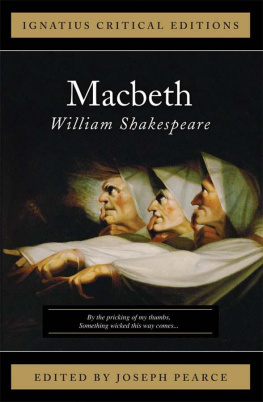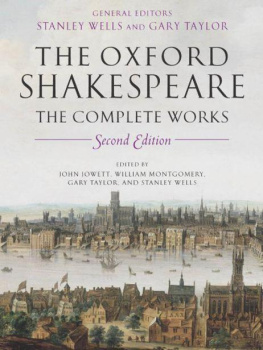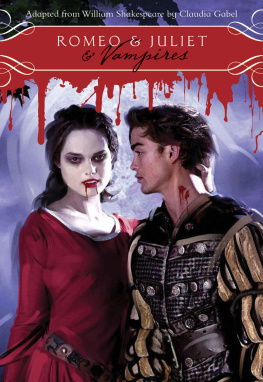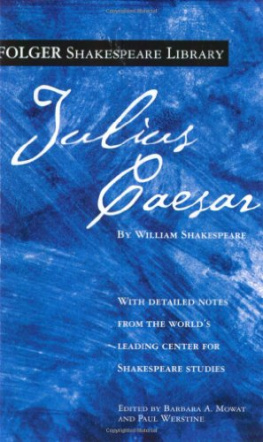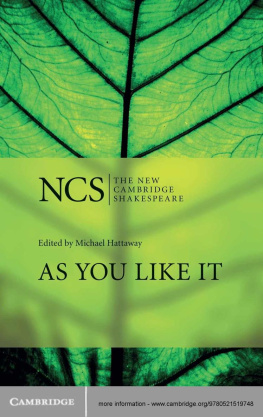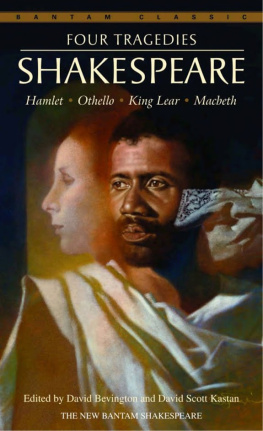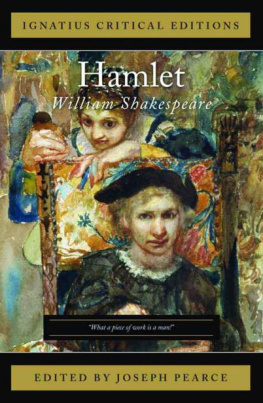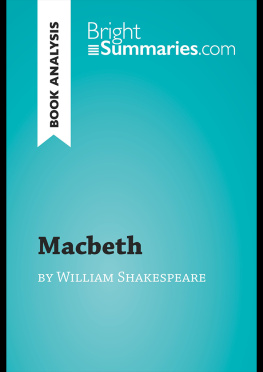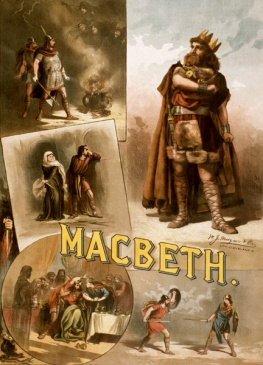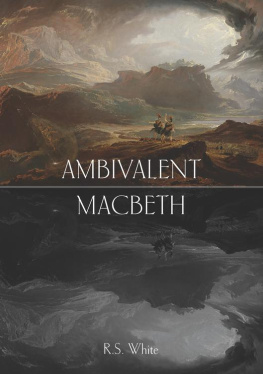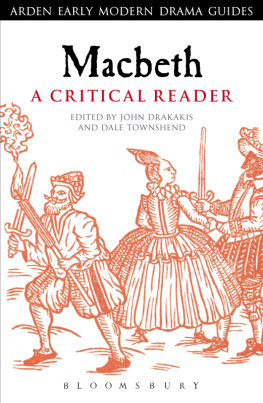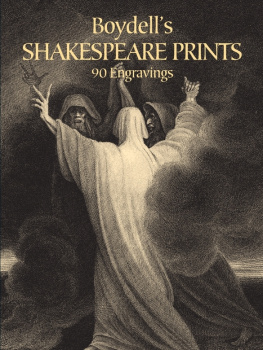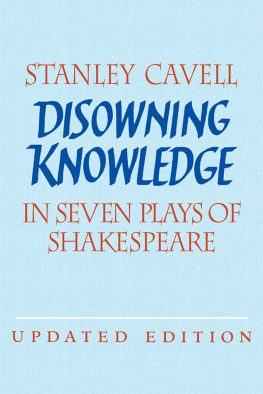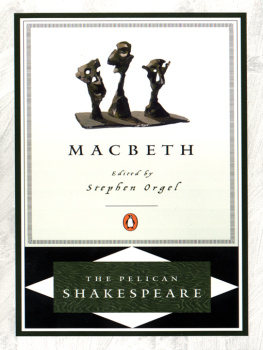William Shakespeare - Macbeth: Ignatius Critical Editions
Here you can read online William Shakespeare - Macbeth: Ignatius Critical Editions full text of the book (entire story) in english for free. Download pdf and epub, get meaning, cover and reviews about this ebook. year: 0, genre: Science. Description of the work, (preface) as well as reviews are available. Best literature library LitArk.com created for fans of good reading and offers a wide selection of genres:
Romance novel
Science fiction
Adventure
Detective
Science
History
Home and family
Prose
Art
Politics
Computer
Non-fiction
Religion
Business
Children
Humor
Choose a favorite category and find really read worthwhile books. Enjoy immersion in the world of imagination, feel the emotions of the characters or learn something new for yourself, make an fascinating discovery.
- Book:Macbeth: Ignatius Critical Editions
- Author:
- Genre:
- Year:0
- Rating:3 / 5
- Favourites:Add to favourites
- Your mark:
- 60
- 1
- 2
- 3
- 4
- 5
Macbeth: Ignatius Critical Editions: summary, description and annotation
We offer to read an annotation, description, summary or preface (depends on what the author of the book "Macbeth: Ignatius Critical Editions" wrote himself). If you haven't found the necessary information about the book — write in the comments, we will try to find it.
William Shakespeare: author's other books
Who wrote Macbeth: Ignatius Critical Editions? Find out the surname, the name of the author of the book and a list of all author's works by series.
Macbeth: Ignatius Critical Editions — read online for free the complete book (whole text) full work
Below is the text of the book, divided by pages. System saving the place of the last page read, allows you to conveniently read the book "Macbeth: Ignatius Critical Editions" online for free, without having to search again every time where you left off. Put a bookmark, and you can go to the page where you finished reading at any time.
Font size:
Interval:
Bookmark:
MACBETH
WILLIAM SHAKESPEARE
With Contemporary Criticism
Edited by JOSEPH PEARCE
IGNATIUS PRESS SAN FRANCISCO
Cover art: Johann Heinrich Fuessli, Three Witches , 1783
Royal Shakespeare Theater Collection, London
Photo credit: Erich Lessing / Art Resource, N.Y.
Cover design by John Herreid
2010 Ignatius Press, San Francisco
All rights reserved
ISBN 978-1-58617-397-5
Library of Congress Control Number 20093508
Printed in the United States of America
Tradition is the extension of Democracy through time; it is the proxy of the dead and the enfranchisement of the unborn.
Tradition may be defined as the extension of the franchise. Tradition means giving votes to the most obscure of all classes, our ancestors. It is the democracy of the dead. Tradition refuses to submit to the small and arrogant oligarchy of those who merely happen to be walking about. All democrats object to men being disqualified by the accident of birth; tradition objects to their being disqualified by the accident of death. Democracy tells us not to neglect a good mans opinion, even if he is our groom; tradition asks us not to neglect a good mans opinion, even if he is our father. I, at any rate, cannot separate the two ideas of democracy and tradition .
G. K. Chesterton
Ignatius Critical EditionsTradition-Oriented Criticism for a new generation
James Bemis
Robert Carballo
Hildegard Hammerschmidt-Hummel
Regis Martin
Lee Oser
AN INTRODUCTION
Joseph Pearce
Ave Maria University
Apart from The Comedy of Errors, Macbeth , a tragedy of errors, is the shortest play that Shakespeare wrote. At only 2,107 lines, it is barely half the length of Hamlet , with which it rivals in popularity and with which it is often compared. The date of its composition is not certain, but clues within the text suggest strongly that it was first performed in 1606. In particular, the discussion of equivocation seems to be an allusion to the trial of the Jesuit Henry Garnet, who was executed in May 1606 for his alleged complicity in the Gunpowder Plot of the previous year. The play was written and first performed, therefore, in the wake of one of the most notorious episodes in English history, an event that is still commemorated in England on November 5 each year as Guy Fawkes Night or bonfire night.
The Gunpowder Plot was a foiled attempt by militant and disaffected Catholics, distraught at the increase in persecution during the second year of King James reign, to kill the king and his ministers by igniting gunpowder during the state opening of Parliament on November 5, 1605. Scholars such as Antonia Fraser, Hugh Ross Williamson, and others have shown that the angry Catholics who became involved in the infamous plot, such as Robert Catesby and Guy Fawkes, were the dupes of the Machiavellian machinations of Sir Robert Cecil, son of the infamous Lord Burghley, and his network of spies. The plot may not have been instigated by Cecil, but there seems to be ample evidence to suggest that he knew about it well in advance, and through the deployment of his spies and agents provocateurs , it was always doomed to failure. Instead of leading to an ending of anti-Catholic repression, as its hotheaded organizers had hoped, the ill-conceived scheme played into the hands of Cecil and his cohorts, who were seeking to persuade the king to increase the persecution of Englands Papists. In the wake of the plot, Catholics found themselves being victimized more brutally and mercilessly than ever.
Shakespeare was related through his mothers family with Robert Catesby, the ringleader of the plotters, and many of Catesbys coconspirators came from the area of England in which Shakespeares own family lived. Considering the tight-knit Catholic community of which his family was a part, it seems likely that Shakespeare was acquainted to some degree with several of those involved in the plot. There is, however, no reason to assume that he failed to share the horror of most Englishmen, Catholic or Protestant, at this planned act of terrorism. The whole hideous affair was too close to home, and too close for comfort, and it is not surprising that Shakespeare sought to distance himself from those involved.
Although the aforementioned allusion to Garnets equivocation offers evidence of this desire to distance himself from the militant madness of the Gunpowder Plot, it does not necessarily mean that he was showing unquestioning or uncritical support for the king. On the contrary, Stephen Greenblatt expresses surprise that Macbeth contains no obvious support for the king in the aftermath of the foiled attempt on his life:
[I]n the wake of the national near catastrophe and the last-minute redemption, it is surprising that the text of Macbeth does not contain so much as a prologue, written to the king, celebrating the recent escape; or a complimentary allusion to Jamess role as the special enemy of Satan and the beloved of God; or a grateful acknowledgment of the happiness of being ruled by Banquos wise heir.Andrew Hadfield, in Shakespeare and Renaissance Politics , insists that it is hard to read Macbeth and King Lear as works that simply accept and reinforce Jamess beliefs. Furthermore, Hadfield contends, it would be a mistake to suggest that belonging to the Kings Men and performing works at court meant a straightforward acceptance of the Kings political beliefs was a necessary prerequisite for such worldly success. The Kings Men, Shakespeares acting troupe, had recently produced Ben Jonsons controversial play Sejanus his Fall , which was known to have provoked the king, and Hadfield summarizes the difference between Shakespeares attitude toward the monarchy during the reign of Elizabeth and his attitude during the reign of James:
Shakespeares plays written after 1603 concentrate far less on the legitimacy of the monarch than his earlier works had done, and far more on the behaviour of the monarch as a ruler in office. In doing so they are generally simultaneously more supportive of monarchy as an institution and equallyif not morecritical of the monarchs conduct.Many people had questioned the legitimacy of Elizabeth, who was born of Henry VIIIs adulterous relationship with Anne Boleyn, arguing that Henry was still legally married to his first wife, Catherine of Aragon, at the time of Elizabeths birth. In May 1533, when Anne Boleyn was already visibly pregnant with Elizabeth, Henry had induced Thomas Cranmer to pronounce the nullification of his marriage to Catherine. Since, however, the annulment of his marriage had already been refused by the pope, many considered Cranmers nullification itself null and void and, in consequence, considered Elizabeth a bastard, born out of wedlock, and therefore disqualified from the right of succession to the throne. This was apparently Shakespeares position, as is clear from his preoccupation with questions of legitimacy in the Elizabethan plays. Ironically, upon his marriage to Jane Seymour, Henry would himself declare Elizabeth illegitimate.
If Shakespeares preoccupation with legitimacy in his Elizabethan plays suggests his scepticism concerning Elizabeths legitimacy, his depiction of the role of the monarchy in his Jacobean plays offers strong evidence of his Christian political philosophy. If, as Hadfield surmises, the plays written after James accession are generally simultaneously more supportive of monarchy as an institution and equallyif not morecritical of the monarchs conduct, it shows Shakespeares position vis--vis the heated politics of the day. At one extreme, the Puritans were opposed to monarchy per se, seeking its overthrow and abolition; at the other extreme, James argued for the divine right of kings, insisting that subjects must obey the monarch regardless of his character and the consequences of his actions.
Next pageFont size:
Interval:
Bookmark:
Similar books «Macbeth: Ignatius Critical Editions»
Look at similar books to Macbeth: Ignatius Critical Editions. We have selected literature similar in name and meaning in the hope of providing readers with more options to find new, interesting, not yet read works.
Discussion, reviews of the book Macbeth: Ignatius Critical Editions and just readers' own opinions. Leave your comments, write what you think about the work, its meaning or the main characters. Specify what exactly you liked and what you didn't like, and why you think so.

